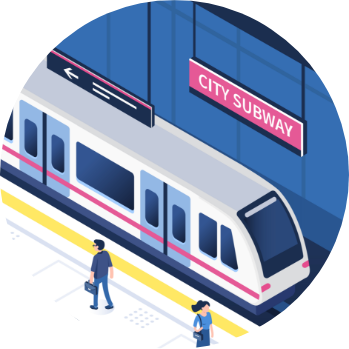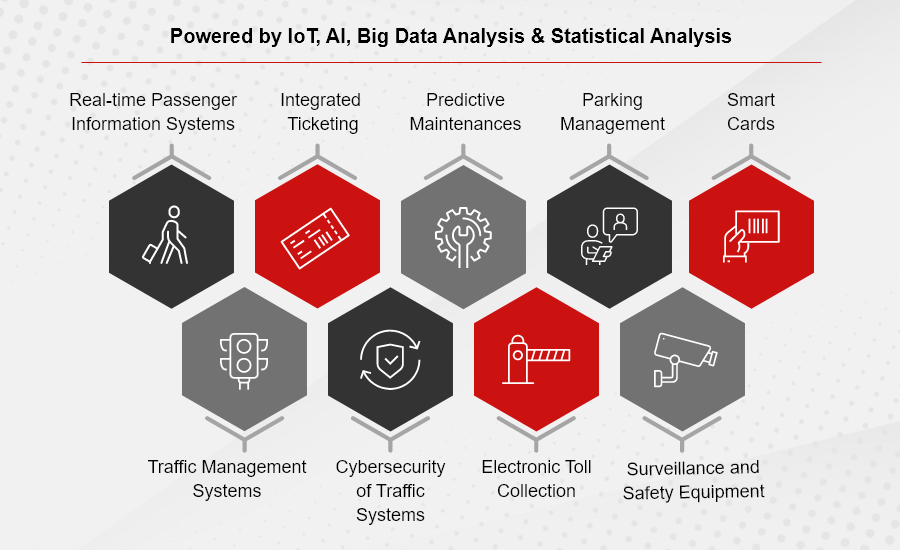India, one of the fastest-growing economies of the world, is heavily investing in infrastructure and transport to transform its cities into world-class Smart Cities. A defining feature of a smart city is Smart Mobility – a revolutionary approach to commuting which promises the citizens affordable, multiple modes of transportation, including rapid mass transit systems, on-demand mobility solutions, ride-sharing, vehicle-sharing, electric vehicles, biking, walking, and even more. Marked by high flexibility, convenience, and clean and green technologies, its goal is to reduce the environmental impact and enhance citizens' quality of life by providing a seamless, uninterrupted, and highly affordable travel thus enabling fulfillment of SDGs.
Rapid urbanization and rising motorization are fueling India’s demand for mobility and leading to inevitable mobility challenges such as congestion, air pollution, and increased time of travel. It’s estimated that by 2050(1), 70% of India’s population will be residing in cities.
A robust, efficient and clean urban mobility infrastructure, that encourages urban dwellers to opt for public transport and shared mobility solutions over individual transport, is the solution to India’s mobility challenges.


National Common Mobility Card (NCMC) – a single smart card enabling commuters to book tickets, use it for metro, buses, and trains, and pay for toll and parking.

India’s mobility landscape faces several challenges, last-mile connectivity being one of them. To solve this issue, Government Authorities are increasingly striving to integrate public transport such as Metrorail with other transit services like PRT, para-transport, feeder buses & electric rickshaws, and non-motorized solutions thereby making public transport more viable. With capital-intensive projects like Metrorail coming under the scanner over financial viability in smaller cities, the government approved the Policy to introduce Metrolite in Tier-II and Tier-III cities. These projects cost 50-75 per cent lesser than medium to heavy Metrorail projects due to no or minimal civil structures, therefore, making it easier for Authorities to implement and as a result deliver high-quality service to commuters at affordable ticket prices.
The acceleration of Smart Mobility and advent of Intelligent Transport System (ITS) promise quick and lasting resolution to several of India’s mobility challenges like long travel durations and inefficient traffic management that frequently disrupted seamless operations and causes unnecessary delays.

Tackling challenges faced by the mobility infrastructure in India, Hitachi leverages its holistic urban transport solutions, ranging from energy-efficient rolling stock, advanced signaling systems, traffic management system, automatic fare collection and financial services solutions, world-class station equipment, passenger information & security solutions, and more, to progressively improve social and economic values for the people of India.
Hitachi has been an active collaborator and contributor in India's railway journey. Its relationship with the Indian Railways dates back to 1950s, when it delivered the first steam locomotive to India. Hitachi Rail STS has set a benchmark in actively displaying how Social Innovation with collaboration can accelerate change. By successfully implementing the Communication Based Train Control (CBTC)-based signalling and telecommunication system for Noida Metrorail project in a record time of 28 months, it has paved the way for an intelligent transport infrastructure with digital integration that puts commuters’ safety and convenience at the forefront.
A state-of-the-art Metrorail system thus put into operations is enhancing the lives of people in rapidly expanding Noida and Greater Noida region. Hitachi systems will enable the Metrorail operator to run in the Automatic Train Operation (ATO) mode and provide seamless public movement between Noida and Greater Noida region, the fastest growing towns in National Capital Region (NCR).
Through its diverse projects, Hitachi is actively contributing towards the Make in India initiative by employing local engineering and management professionals, who are integrating local supply chain with indigenously manufactured products in implementing the projects. Hitachi’s goal of igniting socio-economic welfare transcends to providing employment opportunities to the Indian youth.
India’s evolving social infrastructure and digital revolution is all set to transform the way India will commute. Decreased road congestion, lower carbon emissions, reduced travel time, and ease of travel will greatly improve the quality of life for the citizens of the nation.
Hitachi Social Innovation Business, leveraging proficiency in OT x IT is committed to social empowerment, and is Powering Good by actively partnering with India’s visionary planners, implementers and operators to usher a sustainable, environment-friendly transport infrastructure in India and co-create a better future where people lead a richer, fulfilling life.
1. https://economictimes.indiatimes.com/india-in-need-of-a-structured-infrastructure/toshibashow_dp/50263922.cms